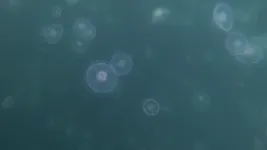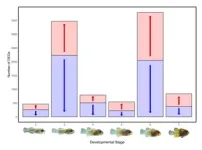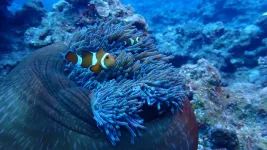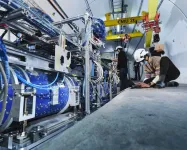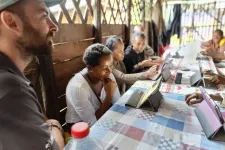(Press-News.org) The human body is made up of thousands of tiny lymphatic vessels that ferry white blood cells and proteins around the body, like a superhighway of the immune system. It’s remarkably efficient, but if damaged from injury or cancer treatment, the whole system starts to fail. The resulting fluid retention and swelling, called lymphedema, isn’t just uncomfortable — it’s also irreversible.
When lymphatic vessels fail, typically their ability to pump out the fluid is compromised. Georgia Institute of Technology researchers have developed a new treatment using nanoparticles that can repair lymphatic vessel pumping. Traditionally, researchers in the field have tried to regrow lymphatic vessels, but repairing the pumping action is a unique approach.
“With many patients, the challenge is that the lymphatic vessels that still exist in the patient aren't working. So it's not that you need to grow new vessels that you can think of as tubes, it’s that you need to get the tubes to work, which for lymphatic vessels means to pump,” said Brandon Dixon, a professor in the George W. Woodruff School of Mechanical Engineering. “That’s where our approach is really different. It delivers a drug to help lymphatic vessels pump using a nanoparticle that can drain into the diseased vessels themselves.”
The researchers published their findings in “Lymphatic-Draining Nanoparticles Deliver Bay K8644 Payload to Lymphatic Vessels and Enhance Their Pumping Function” in Science Advances in February.
The Benefit of Nanotechnology for Drug Delivery
The drug the researchers used, S-(-)-Bay K8644 or BayK, normally targets L-type calcium channels that enable the skeletal, cardiac, and endocrine muscles to contract. In effect, the application of BayK throughout the body would lead to convulsions and spasms.
Using nanoparticles designed to drain into lymphatic vessels after injection focuses the drug solely into the lymphatic vessels, draining the injection site. As a result, the drug is available within lymphatic vessels at a locally high dose. When lymph is eventually returned into the circulation, it’s diluted in the blood so much that it doesn’t affect other systems in the body, making the drug for lymphedema applications both targeted and safe.
“Lymphatic tissues work like river basins — regionally you have vessels that drain the fluid out of your tissues,” said Susan Thomas, Woodruff Associate Professor of Mechanical Engineering in the Parker H. Petit Institute for Bioengineering and Bioscience. “This method is like putting nanoparticles in the river to help the river flow better.”
The research is the perfect blend of Dixon’s and Thomas’ respective expertise. Dixon’s lab has been studying how lymphatics function in animal models for years. Thomas engineers nanoparticle drug delivery technologies that deploy in the lymphatic system.
“He develops analysis tools and disease models related to the lymphatic system, and I develop lymphatic-targeting drug delivery technologies,” Thomas said. “Tackling lymphedema as a widely prevalent condition for which there are no efficacious therapies was the perfect opportunity to leverage our strengths to hopefully move the needle on developing new strategies to serve this underserved patient population.”
Testing the Therapy
The Dixon and Thomas lab teams tested the formulation using rodent models. They first mapped the model’s lymph node system by injecting a fluorescent substance to see how it traveled. Then they applied a pressure cuff to measure how the lymphatic system fails to function when compromised. From there, they evaluated how formulating BayK in a lymph-draining nanoparticle influenced the drug’s effects. The delivery system allowed the drug to act within the lymphatic vessel, as demonstrated by increased vessel pumping and restored pumping pressure, and drastically reduced the concentration of BayK in the blood, which is typically associated with unwanted side effects.
The researchers are expanding the formulation to more advanced disease models to move it closer to human application. They will also explore how it can be used to prevent or treat lymphedema in combination with other existing or new therapies now being developed.
CITATION: Sestito, L.F., To, K., Cribb, M., Archer, P.A., Thomas, S.N.§, Dixon, J.B.§, 2023. Lymphatic-draining nanoparticles deliver Bay K8644 payload to lymphatic vessels and enhance their pumping function. Science Advances. 6: eabd7134.
DOI: DOI: 10.1126/sciadv.abq0435
#####
The Georgia Institute of Technology, or Georgia Tech, is one of the top public research universities in the U.S., developing leaders who advance technology and improve the human condition. The Institute offers business, computing, design, engineering, liberal arts, and sciences degrees. Its more than 45,000 undergraduate and graduate students, representing 50 states and more than 148 countries, study at the main campus in Atlanta, at campuses in France and China, and through distance and online learning. As a leading technological university, Georgia Tech is an engine of economic development for Georgia, the Southeast, and the nation, conducting more than $1 billion in research annually for government, industry, and society.
END
Nanotechnology could treat lymphedema
2023-03-20
ELSE PRESS RELEASES FROM THIS DATE:
Chicago Quantum Exchange Annual Report highlights 2022 growth
2023-03-20
The Chicago Quantum Exchange (CQE) continued to expand its diverse community of quantum researchers, leaders, and institutions in 2022—launching a quantum research fellowship for undergraduates, welcoming 11 new corporate partners, and extending a regional quantum communication network to a total length of 124 miles.
These are among the successes highlighted in the CQE’s newly published annual report, which chronicles the many contributions of the consortium’s members and partners and offers a window into the region’s ...
Jellyfish size might influence their nutritional value, UBC study finds
2023-03-20
Drifting along in ocean currents, jellyfish can be both predator and prey. They eat almost anything they can capture, and follow the typical oceanic pattern of large eats small. Now a recent University of British Columbia study on these gelatinous globs suggests jellyfish may get more nutritious as they get bigger.
As jellyfish grow, their size changes largely due to the chances of prey encounter, the length and number of tentacles, and their bells (the umbrella-like part of them). As a result, smaller jellyfish eat phytoplankton, microzooplankton, and eggs, while larger jellyfish can eat all of that plus shrimp and even fish. However, ...
What Darwin couldn’t see: Expedition to uncover invisible life in Galápagos
2023-03-20
An international research team led by the Netherlands Institute of Ecology (NIOO-KNAW) is to search for invisible life in the Galápagos Islands. The diversity of bacteria and other microscopic organisms may not be evident to the naked eye, but it is essential to nature. To the islands' giant daisies, for instance: unique endemic plants that are currently under threat.
How unique and diverse is the invisible microbial life of the iconic Galápagos Islands? That's what the Galápagos Microbiome Project - a group of scientists from the Netherlands, ...
In hot water: Ocean warming impacts growth, metabolic rate and gene activity of newly hatched clownfish
2023-03-20
Future ocean warming and marine heatwaves could impact the growth and development of clownfish during their earliest life stages, suggests a new study recently published in the journal, Science of The Total Environment.
A team of marine biologists from the Okinawa Institute of Science and Technology (OIST) reared the iconic coral reef fish in captivity at water temperatures of either 28°C or 31°C. Temperatures of 28°C represent current summer seawater temperatures in Okinawa, whilst temperatures of 31°C are reached during ...
Researchers study the impact of cancer on Hispanic patients and their caregivers
2023-03-20
Cancer, in all of its forms, is a public health concern responsible for more than 8 million deaths each year in the United States. In addition to its effect on patients and the health care system in general, cancer also places a burden on non-professional caregivers such as family members and friends. This can be especially true for the Hispanic population, where communication barriers, financial difficulties and sociocultural issues can be significant.
In a recently published review article, Jasbir ...
Workers' and bosses' trust in teleworking is key
2023-03-20
In recent years, teleworking – spurred by the implementation of information and communication technologies and the recent pandemic, particularly – has become a feature of many jobs. Many companies have now made this form of working available to their employees, but it is still far from common practice in today's labour market.
Universitat Oberta de Catalunya (UOC) researchers have analysed the different perspectives and perceptions on teleworking, looking at the wide range of ...
First detection of neutrinos made at a particle collider
2023-03-20
A team including physicists of the University of Bern has for the first time detected subatomic particles called neutrinos created by a particle collider, namely at CERN’s Large Hadron Collider (LHC). The discovery promises to deepen scientists’ understanding of the nature of neutrinos, which are among the most abundant particles in the universe and key to the solution of the question why there is more matter than antimatter.
Neutrinos are fundamental particles that played an important role in the early phase of the universe. They are key to learn more about the fundamental ...
Coffee plantations limit birds’ diets
2023-03-20
Cast your mind back to the spring of 2020, when grocery store shelves sat bare of essential items and ingredients. For birds who live in the forests of Central America, replacement of forest land with coffee plantations essentially “clears out the shelves” of their preferred foods, causing them to shift their diets and habitats to survive.
A new study led by researchers at the University of Utah explores a record of birds’ diets preserved in their feathers and radio tracking of their movements to find that birds eat far fewer invertebrates ...
Researchers identify key source of T cell "exhaustion"
2023-03-20
Custom-made to attack cancer cells, CAR T-cell therapies have opened a new era in the treatment of human cancers, particularly, in hematologic malignancies. All too often, however, they display a frustrating trait inherited from the body's own immune system cells: a drastic loss of cancer-fighting fervor known as "exhaustion”. Exhaustion is not only seen in cancer-fighting T cells but is also frequent in the setting of viral infections, such as human immunodeficiency virus (HIV), hepatitis B/C viruses (HBV, HCV) and COVID-19 (SARS-CoV-2).
The lapse into listlessness has diminished the effectiveness of CAR T-cell therapies in some patients and prompted scientists to try ...
How do we make farming better for the planet? Ask women
2023-03-20
When a family of five-ton elephants stomps and chomps its way through your crops, there’s only one winner. And in the central African nation of Gabon, farmers are getting fed up with the giant animals trampling their fields—and their livelihoods.
In conservation terms, Gabon is a success story—protected areas and tough anti-poaching measures have allowed the numbers of critically endangered African forest elephants to stabilize. But with food prices rising, anti-elephant protests have been spiking too. “Some people cannot farm anymore—the elephants are eating so much of their crops,” Gabon’s environment minister ...

